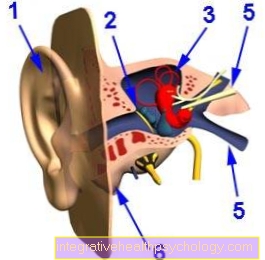
Medical: hypacusis
English: deafness
Deafness (hypacusis) is a reduction in hearing that can range from mild hearing loss to complete deafness.
Hearing impairment is a widespread condition that occurs in both young people and more often in old people. In Germany around six percent of the population is affected by hearing loss. It is noticeable that the age at which hearing loss occurs is decreasing. Naturally, however, the hearing loss only progresses with increasing age.
$config[ads_text1] not found
One only becomes aware of a decrease in hearing when familiar noises, sounds and voices are suddenly no longer perceived or understood. The hearing loss usually occurs gradually and can be perceived as a significant disability if the damage has already occurred.
The focus is not so much on the therapy of hearing loss, but rather on prevention at a young age. There are many preventive measures that can be taken to preserve our hearing. There are legal regulations in the workplace, according to which you are not allowed to expose yourself to a volume of more than 85 decibels (dB) without hearing protection, but this limit is reached especially in leisure time. Discos, rock concerts, loud music through headphones, car races, etc. generate such noise that can in the long term damage your hearing inexorably.
The assessment of the degree of hearing loss is an assessment of the various tests with special consideration of tone audiometry.
Further information is also available under our topic hearing test / tone audiometry
But the ability to understand the other person and the limitations that the patient reports to the doctor also play a role in the overall assessment.
The table divides the hearing loss as a percentage and gives an example in the right column of what can no longer be heard in the event of a hearing loss.
The root cause A hearing impairment can be found in different locations of the complicated ear. A rough subdivision into sound conduction and sound sensation disorders can provide an indication of the location of the damage.

$config[ads_text2] not found
$config[ads_text3] not foundFor the treatment of hearing loss, the decisive factor is whether it is sudden (acute) or has existed for a long time (chronic).
The ear, nose and throat specialist must be informed about this in order to make a correct diagnosis.
Sudden hearing loss or deafness are emergencies and require immediate examination by an ENT doctor.